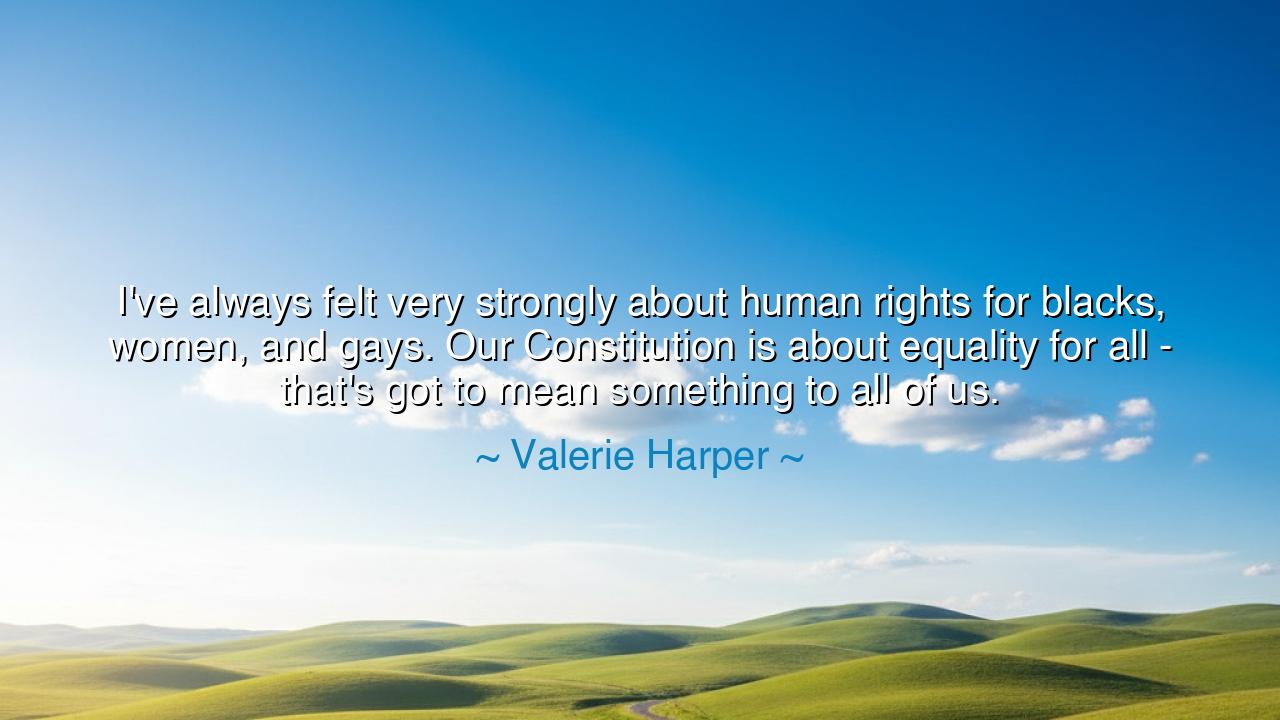
I've always felt very strongly about human rights for blacks
I've always felt very strongly about human rights for blacks, women, and gays. Our Constitution is about equality for all - that's got to mean something to all of us.






"I've always felt very strongly about human rights for blacks, women, and gays. Our Constitution is about equality for all - that's got to mean something to all of us." These stirring words from Valerie Harper call upon us to reflect on the sacred promise embedded in the very foundation of our nation: the principle of equality for all. The Constitution, that revered document, was forged in the fires of revolution, designed to secure the rights of the people. But Harper reminds us that these rights, these promises, are not simply words to be etched into parchment—they are a call to action, a reminder that equality must be upheld for every individual, regardless of their race, gender, or sexuality.
From the earliest days of civilization, the pursuit of human rights has been a central theme in the story of humanity. In ancient Greece, philosophers such as Socrates and Aristotle debated the nature of justice, fairness, and the rightful place of individuals within society. Their teachings spoke of the ideal society, one where all were treated justly, regardless of their status or birth. Yet, in their time, inequality was common, and the rights of women and those outside the aristocracy were often disregarded. It was only in later centuries, through the struggles of oppressed peoples, that these ancient ideas began to take root in a broader sense, leading to the great shifts in thought and law that would define modern concepts of equality and human rights.
Harper’s words, however, urge us to move beyond lofty ideals to real, tangible change. When she speaks of her strong feelings for the rights of blacks, women, and gays, she echoes the struggles of those who have fought for their freedom in the face of relentless oppression. The fight for the rights of African Americans in the United States, exemplified by Frederick Douglass, Sojourner Truth, and the civil rights movement, is a testament to the enduring fight for justice. These brave souls understood that true equality was not something granted by rulers, but something inherent in the nature of humanity itself—a right that could not be denied, no matter the forces of prejudice or hatred.
Similarly, the struggle for women's rights has been a long and difficult journey, one that began with Susan B. Anthony and Elizabeth Cady Stanton in the 19th century and continued with the tireless efforts of suffragists and feminists throughout history. Harper’s support of women's rights reminds us that the promise of equality has not been fully realized until women stand on equal footing with men. From the right to vote to equal pay and representation, the fight for women’s equality is deeply tied to the very principles of the Constitution—the belief that all people are created equal and are entitled to the same rights and opportunities.
The struggle for the rights of gays—once marginalized, criminalized, and oppressed—is perhaps one of the most powerful modern movements of our time. The stories of Harvey Milk, Marsha P. Johnson, and countless others who stood for the rights of the LGBTQ+ community stand as a testament to the belief that the rights of all are sacred, no matter who they love or how they identify. The journey for gay rights has been one of pain, perseverance, and victory, with significant strides made in the battle for marriage equality, anti-discrimination laws, and social acceptance. Harper’s statement reminds us that the Constitution's promise of equality must extend to gays as well, for they, too, are entitled to live their lives free from persecution and discrimination.
In every corner of history, there have been voices crying out for justice, and Valerie Harper’s words echo that call. When she states that equality must “mean something to all of us,” she challenges us to take responsibility for the society we create. It is not enough to simply pay lip service to the ideals of equality; we must actively fight to ensure that those ideals are embodied in our laws, our communities, and our hearts. The Constitution is not merely a historical document; it is a living, breathing testament to the principles upon which our nation was founded. These principles must be upheld for everyone, not just for some.
The lesson here is one of action. We must not stand idle while others suffer under the weight of inequality. The promise of equality for all is not a distant ideal; it is a call to action today. Each of us must do our part—whether through advocacy, education, or simply standing with those whose voices are still silenced. We must work toward a society where race, gender, and sexuality are no longer barriers to justice, but where the rights of all people are equally respected. Only then will the promise of equality truly mean something—for all of us.
Let us, then, honor the wisdom of those who have come before us by continuing their struggle, by ensuring that human rights are a living reality, not just a distant hope. Let us live in accordance with the ideals of freedom, equality, and justice that have been passed down through the ages, and let us work to create a world where every individual, regardless of who they are, can live in dignity and equality. In doing so, we will fulfill the true promise of Valerie Harper’s words and the enduring legacy of those who fought for human rights before us.






AAdministratorAdministrator
Welcome, honored guests. Please leave a comment, we will respond soon